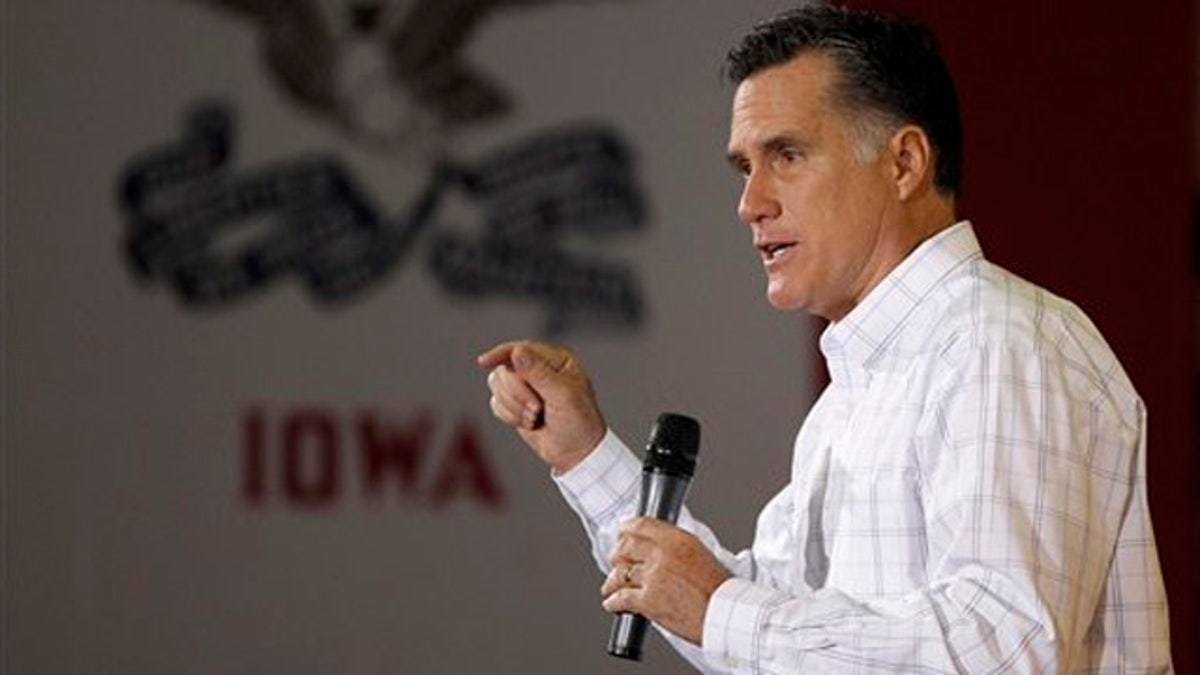
Dec. 16, 2011: Mitt Romney speaks during a rally at Missouri Valley Steel in Sioux City, Iowa. (AP)
With the last pre-caucus debate in the rearview, the Republican presidential candidates are hitting the ground in a mad dash to meet and greet voters before their minds are made up and they tune politics out.
The Fox News debate Thursday night in western Iowa was a critical opportunity for the candidates to make their closing arguments on a host of issues ranging from foreign policy to the economy to sheer electability. The next two and a half weeks will be about the personal touch, as the candidates pack their schedules in Iowa and beyond with visits to every pizza parlor and diner they can find.
The second-tier candidates are making a big push. As Texas Gov. Rick Perry set out on a statewide Iowa bus tour, Minnesota Rep. Michele Bachmann followed an aggressive performance at Thursday night's debate with an aggressive schedule of stops at restaurants and coffee shops across western Iowa.
The leaders of the pack, former House Speaker Newt Gingrich and former Massachusetts Gov. Mitt Romney, have the leeway to look a bit beyond Iowa as they try to map a delegate-amassing course to victory.
Romney -- who is aiming to do well in Iowa but has not pinned his campaign strategy on his performance in the Jan. 3 caucuses -- started Friday to make a play for South Carolina voters.
After appealing to steel workers Friday morning in Sioux City, Iowa, for their support in the caucuses, Romney was heading to South Carolina to join up with that state's governor, Nikki Haley, who on Friday morning endorsed Romney for president.
Haley's endorsement was highly prized -- not only is she a well-regarded Republican governor, but she represents the state that holds the first-in-the-South primary next month, one that historically has been key for any GOP presidential nominee.
Gingrich, a southerner himself, has been dominating the polls in the Palmetto State. But Haley said Romney's experience in the private and public sectors proves he can deal "with a broken Washington."
Romney also released a TV ad in South Carolina touting his leadership attributes.
"I think people understand that I'm a man of steadiness and constancy," Romney says in the ad, which has already run in Iowa and New Hampshire -- a state critical to Romney's early primary strategy.
How much Haley's endorsement will matter in South Carolina, however, is unclear.
South Carolina is a difficult state for Romney; he competed aggressively there when he first ran for president in 2008 only to bail shortly before the primary when it became clear that he would get crushed after to failing to ease voter concerns about his Mormon faith and his reversals on social issues.
At the debate Thursday, Romney stuck mostly to his record as an executive with much-needed economic experience.
Gingrich, though, was put on the defensive over his decades in Washington, his post-congressional career as a consultant and whether he was conservative enough to be the Republican Party standard-bearer.
But Gingrich bluntly defended his time in and out of office, and pointed to a 90 percent conservative voting record while a member of Congress, including four years as speaker of the House. But Rick Santorum, who was elected to the Senate in the 1994 Republican Revolution, said Gingrich faced a "conservative revolution" from within his own ranks while he was speaker.
The fast-paced debate underscored the state of the race, with Gingrich atop the polls nationally and in Iowa and Romney, Texas Rep. Ron Paul and Gingrich's other pursuers working in TV ads and elsewhere to overtake him.
The Associated Press contributed to this report.




